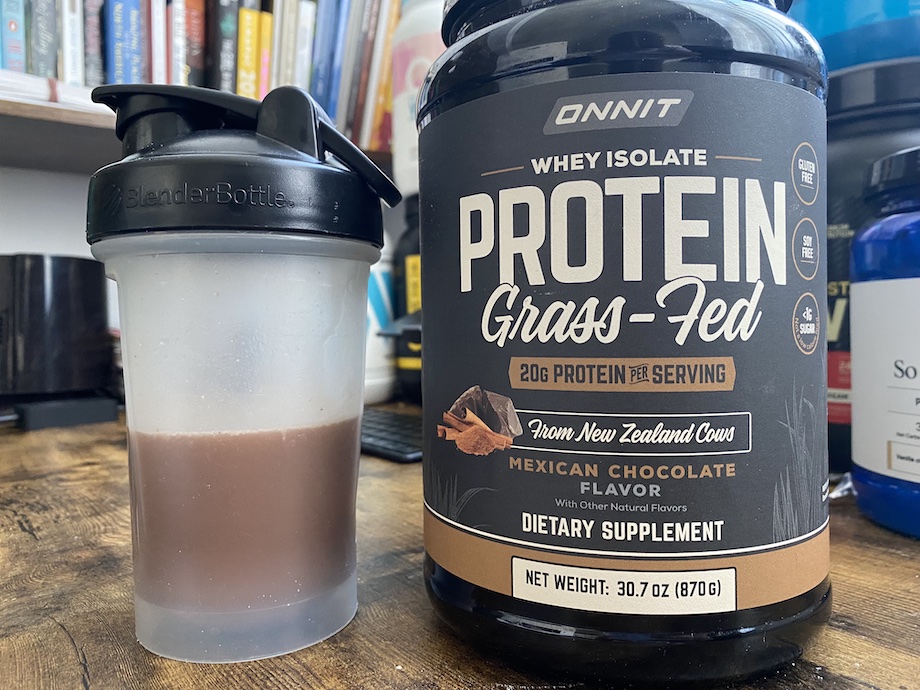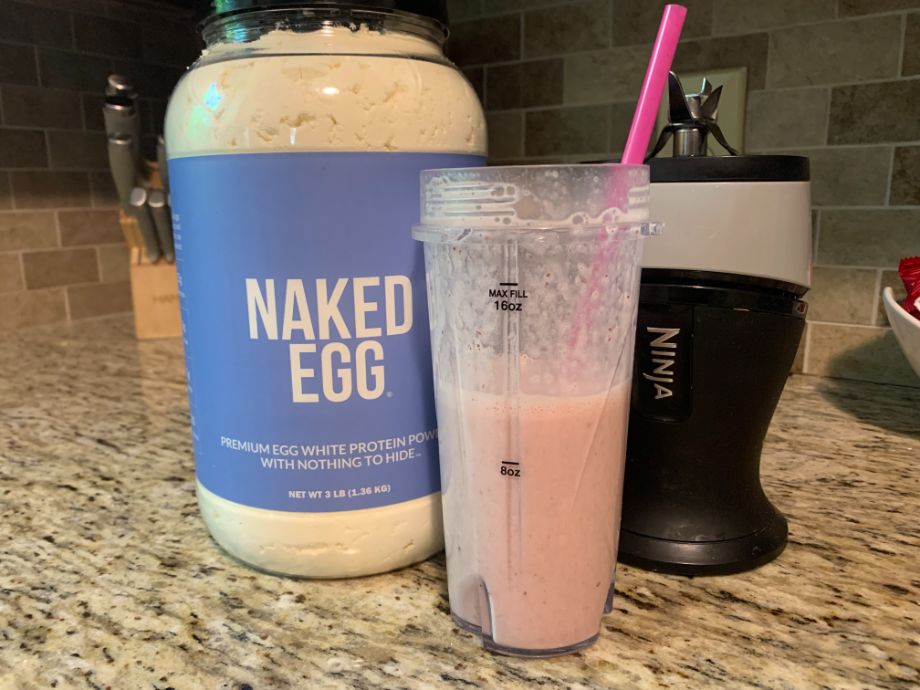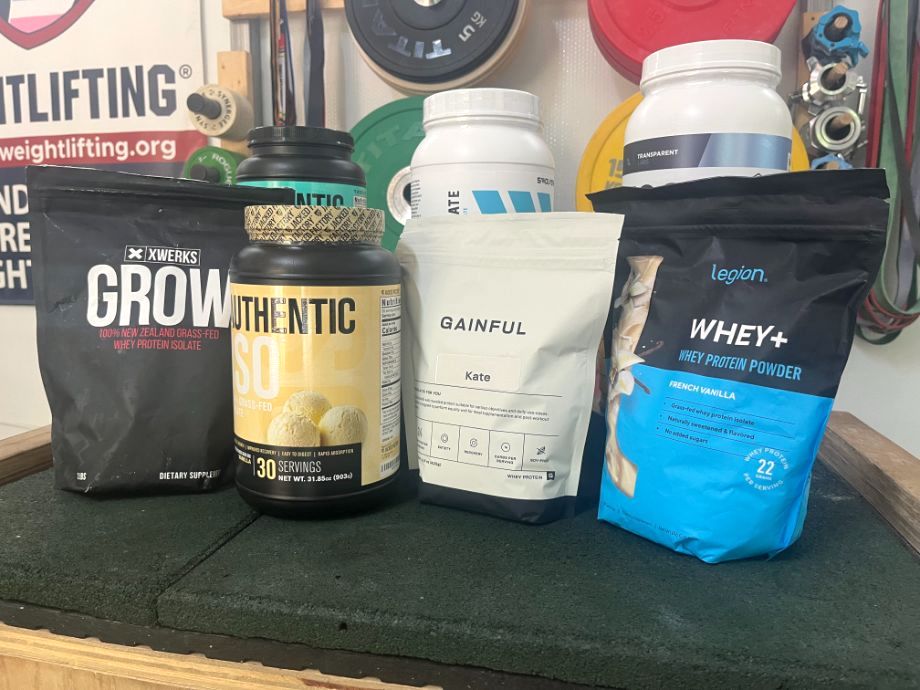We test and review fitness products based on an independent, multi-point methodology. If you use our links to purchase something, we may earn a commission. Read our disclosures.
Whey protein powder is a popular dietary supplement and many people see it as a simple way to boost their health. After all, protein is the building block of your muscles, bones, and skin and it plays a very important role in the creation and maintenance of the cells in your body.
Whey protein is generally safe for most people to take, but there are some drawbacks and potential adverse side effects of whey protein. This includes, but is not limited to, allergy and medical condition triggers, digestive problems, unwanted weight gain, and more. Keep reading to learn more about whey protein and the potential whey protein side effects, possible benefits, and whey protein alternatives.
What Is Whey Protein?
We consulted with registered dietitian nutritionist Chelsea Rice who explained that whey is a term that refers to the liquid part of milk that remains as a part of the cheese-making process. The proteins in this liquid are then separated and purified, yielding different varieties of whey protein.
There are three main types of whey protein: whey protein concentrate, whey protein isolate, and whey protein hydrolysate. Whey protein concentrate is what is yielded after the removal of some lactose, water, and some minerals. Whey protein concentrate still contains carbohydrates (lactose) and fats alongside protein (approximately 70-80% protein).
Whey protein isolate is what is yielded after even further processing of whey protein and contains 90% or higher of protein concentrates. A large amount of fat and lactose is removed during the processing of whey isolate. Therefore, whey isolate has less carbohydrates (lactose) and fat.
Whey protein hydrolysate is produced after companies use heat, acid, enzymes, or a combination to break down some of the amino acid bonds, allowing for nutrients to be absorbed rapidly by your body. This is commonly known as the “predigested” form of whey protein. All forms of whey contain branched-chain amino acids and are all made from the same milk, providing all essential amino acids1.
Is Taking Whey Protein Powder Safe?
Chelsea Rice, RDN, LDN, says that based on current research2, as long as an individual does not have an allergy to dairy products and does not take more than the amounts recommended, whey protein is generally safe for most people to take. If you have any underlying conditions such as kidney problems or liver damage, it is recommended to speak with a healthcare professional before consuming whey protein.

The Food and Drug Administration (FDA) does not approve dietary supplements for safety and effectiveness. This is why we always recommend searching for a protein powder from a reputable company with third-party testing to ensure the safety and transparency of the products you take.
Whey protein powder is commonly used in protein shakes, but can also be used in other ways such as mixing into oatmeal, energy bites, protein bars, and much more. If you’re in the market for a new protein powder, be sure to check out our roundup of the best protein powder according to experts.
Potential Adverse Side Effects of Whey Protein
Could Trigger Allergies
Because whey protein is derived from cow’s milk, taking whey protein can trigger allergies in someone who is allergic to dairy products. Signs and symptoms of a milk allergy include hives, wheezing, itching or tingling, coughing, shortness of breath, vomiting, and swelling of the lips, tongue, or throat. If you have a milk allergy3, it is typically advised to avoid dairy products, including whey protein.
Could Cause Digestive Problems
One of the most common side effects reported is digestive problems including bloating, cramping, stomach pain, indigestion, diarrhea, and constipation. Chelsea says, “For most, those side effects may be related to being lactose intolerant. For others, digestive problems might be a side effect to the amount of whey protein supplements that are being consumed. The recommended dietary allowance of protein for an average sedentary adult is 0.8 grams per kilogram of body weight.”
RELATED: How Much Protein Is Too Much?
People who exercise regularly have higher protein needs4, averaging between 1.1 and 1.7 grams per kilogram, depending on their medical history, wellness goals, workout regimen, and more. Generally, most people can only digest anywhere from 20 to 40 grams of protein at a time5. Staying within the recommended servings can help to reduce the risk of digestive problems.
Could Lead to Unwanted Weight Gain
Whey protein supplements alone may not make you gain weight, as whey protein may actually offer some benefits for weight loss. However, whey protein supplements do serve as a source of calories and protein, therefore contributing to your total daily calorie and protein intake. Some whey protein powders may also be high in added sugars.

RELATED: Is Protein Powder Good for Weight Loss?
“When shopping for a protein powder, be sure to read the nutrition facts label and ingredients to look for added sugar,” Chelsea advises, “Being mindful of the amount of whey protein you’re consuming and ensuring you are staying within your calorie and protein for the day can help to reduce the risk of unwanted weight gain.”
Could Lead to or Trigger Existing Medical Conditions
Evidence suggests that excessive protein intake could lead to or trigger existing medical conditions such as kidney function, liver function, and gout. When it comes to your kidneys, excessive protein intake is more of a health concern in individuals with pre-existing kidney disease. At this time, the literature lacks significant research6 showing a link between protein intake and the start or progression of kidney disease in healthy individuals.
A 2014 study7 showed that short-term intake of whey protein can lead to an increase in apoptosis (death of cells) in the liver, while long-term intake may increase inflammation. Although, it is important to note that this study was done on sedentary rats and further studies are needed to evaluate other inflammatory pathways and the impact on the liver.
Gout is a common form of inflammatory arthritis that usually affects one joint at a time (often the big toe joint). Gout8 is caused when there is too much uric acid in the body. Your body produces uric acid, which breaks down purine (a chemical compound found in many foods). Some health care providers prescribe a low purine diet for people with gout. Therefore, if you are diagnosed with gout it may be recommended to limit your intake of whey protein, as it contains a small amount of purines.
Potential Benefits of Using Whey Protein
Because whey protein is a by-product of milk, it is considered a complete, high-quality protein that contains all of the essential amino acids and has many potential health benefits. Although your body makes many amino acids, it does not make essential amino acids. You have to get essential amino acids from your diet, so supplementing with a whey protein powder is one way to get those essential amino acids.

Supplementing with whey protein along with resistance exercise may also help promote the growth of lean muscle mass, decrease body fat, and lose weight. In a 2017 systematic review9, data from 49 studies with 1,863 participants showed that dietary protein supplementation significantly enhanced changes in muscle strength and size during prolonged resistance training (>6 weeks) in healthy adults. Although, factors such as age and training experience can impact the efficacy of protein supplementation for building muscle. Eating a high protein diet has shown potential beneficial outcomes10 when it comes to weight loss including increasing satiety, increasing thermogenesis, and burning of fat. If you’re looking to lose weight, check out our article, The Best Protein Powder for Weight Loss.
Many people also use whey protein powder to help improve blood pressure, cholesterol levels, blood sugar levels, and reduce the risk of many other health conditions including heart disease and osteoporosis. However, there needs to be more research done, as there are not consistent findings with these theories. There may be potential benefits of using whey protein, but it is important to remember that whey protein powder is a supplement, and you should still prioritize getting protein and other nutrients through your diet as well.
RELATED: High-Protein Foods
Alternatives to Whey Protein
The most common alternative of whey protein is a plant-based protein powder. Other non-vegan whey protein powder alternatives include egg white protein, casein protein, and collagen peptides.
Plant-Based Protein
Plant-based protein powders come in an array or forms including pea, hemp, brown rice, soy, quinoa, and more. Sometimes plant-based protein powders contain a blend of plant-based proteins, such as pea and brown rice. If you’re interested in learning more about plant protein powders, check out our roundup of the best vegan protein powder.
Egg White Protein
Egg whites are commonly known as a great source of protein. Egg white protein powder is made by removing the yolks from eggs then dehydrating and pasteurizing the whites.

Casein Protein Powder
Similar to whey, casein protein powder is also a by-product of cow’s milk. Unlike whey, which is the liquid substance formed during cheesemaking, casein is the coagulated curds. These curds are then dried and turned into a protein powder.
RELATED: Best Casein Protein Powder
Collagen Peptides
Collagen11 accounts for 30% of your body’s protein. It is the most abundant protein in your body. Its main role is to provide structure, support, and strength throughout your body. As you age, your body starts to produce less collagen and break down existing collagen at a faster rate. Collagen peptides are small pieces of animal collagen that have been turned into pills and powders. Collagen peptides do contain amino acids, but do not contain all of the essential amino acids.
RELATED: Best Collagen Supplements
Whey Protein Side Effects: Q&A
Is it OK to drink whey protein every day?
If drinking whey protein, it is important to remember that it should be used as a supplement to a well-balanced diet and not in replacement to protein found in real foods. For most individuals, whey protein supplements may be safe to take daily, although you might not need it daily depending on your medical needs, wellness goals, and exercise regimen. High doses can cause some side effects, listed above, including but not limited to digestive problems, weight gain, and the triggering of existing medical conditions.
Who should not drink whey protein?
If you have a milk allergy you should not drink whey protein, as it could cause an allergic reaction. Other individuals who may not benefit from drinking whey protein are those who have pre-existing conditions such as kidney or liver disease. It is always best to consult with a healthcare professional, such as your doctor or registered dietitian before taking whey protein powder. Based on your medical history and wellness goals, these practitioners will be able to give you the appropriate advice and personalize your needs.
Does whey protein have long-term side effects?
Studies do suggest that excessive consumption of whey protein supplementation without professional guidance over a long period of time may have some adverse effects on the body, specifically on kidney and liver function. These studies have shown12 that this is aggravated when associated with a sedentary lifestyle. Although, the current research and data suggest a need for future studies on the impact of different types of whey protein with and without exercise. This will allow researchers to get a deeper understanding of the impact whey protein has on human physical health.
Does whey protein have side effects on sperm?
Whey protein supplements are a billion dollar industry, with a high population of consumers being young men. However, up until recent years there have been limited studies on the consumption of these products and the effects it may have on reproductive health.
A 2020 study13 assessed the effect of whey protein supplementation on the sperm quality and reproductive health of male mice. A total of 48 male mice were fed with either water or a high dose of whey protein for 3 months. The mice were then individually housed with two female mice for five days and reproductive parameters were assessed. No significant differences were detected between the groups in the sperm count, sperm motility, serum testosterone, number of impregnated females, litter sizes, and more.
The results of this study suggested that even the highest recommended human dose of whey protein supplementation did not significantly impair the sperm quality and fertility in male mice, although more research could be conducted since there are limited studies at this time. If you are a male looking to add in whey protein to help you gain strength and build muscle mass, check out our Best Protein Powder for Men.
References
- Hoffman JR, Falvo MJ. Protein – Which is Best?. J Sports Sci Med. 2004;3(3):118-130. Published 2004 Sep 1.
- Center for Food Safety and Applied Nutrition. (2022, October 21). Information for consumers on using dietary supplements. U.S. Food and Drug Administration.
- Mayo Foundation for Medical Education and Research. (2022, June 16). Milk allergy. Mayo Clinic. Retrieved from https://www.mayoclinic.org/diseases-conditions/milk-allergy/symptoms-causes/syc-20375101
- Kristi Wempen, R. D. N. (2022, April 29). Are you getting too much protein? Mayo Clinic Health System.
- Pogored. (2022, December 8). Whey protein: Health benefits and potential side effects. Cleveland Clinic.
- Martin, W. F., Armstrong, L. E., & Rodriguez, N. R. (2005). Dietary protein intake and renal function. Nutrition & Metabolism, 2(1). https://doi.org/10.1186/1743-7075-2-25
- Gürgen, S. G., Yücel, A. T., Karakuş, A. Ç., Çeçen, D., Özen, G., & Koçtürk, S. (2014). Usage of whey protein may cause liver damage via inflammatory and apoptotic responses. Human & Experimental Toxicology, 34(7), 769–779. https://doi.org/10.1177/0960327114556787
- Centers for Disease Control and Prevention. (2020, July 27). Gout. Centers for Disease Control and Prevention. Retrieved from https://www.cdc.gov/arthritis/basics/gout.html
- Morton, R. W., Murphy, K. T., McKellar, S. R., Schoenfeld, B. J., Henselmans, M., Helms, E., Aragon, A. A., Devries, M. C., Banfield, L., Krieger, J. W., & Phillips, S. M. (2017). A systematic review, meta-analysis and meta-regression of the effect of protein supplementation on resistance training-induced gains in muscle mass and strength in healthy adults. British Journal of Sports Medicine, 52(6), 376–384. https://doi.org/10.1136/bjsports-2017-097608
- Paddon-Jones, D., Westman, E., Mattes, R. D., Wolfe, R. R., Astrup, A., & Westerterp-Plantenga, M. (2008). Protein, weight management, and satiety. The American Journal of Clinical Nutrition, 87(5). https://doi.org/10.1093/ajcn/87.5.1558s
- Collagen: What it is, types, function & benefits. Cleveland Clinic. (2022, May 23). Retrieved from https://my.clevelandclinic.org/health/articles/23089-collagen
- Vasconcelos, Q. D., Bachur, T. P., & Aragão, G. F. (2021). Whey protein supplementation and its potentially adverse effects on Health: A Systematic Review. Applied Physiology, Nutrition, and Metabolism, 46(1), 27–33. https://doi.org/10.1139/apnm-2020-0370
- Ketheeswaran, S., Pors, S. E., Zuniga Jara, L. A., Lemser, C. E., Høj, T. K., Bøtkjær, J. A., Christensen, P., Humaidan, P., & Kristensen, S. G. (2020). Effect of whey protein supplementation on sperm quality and fertility in male mice. Food and Chemical Toxicology, 141, 111366. https://doi.org/10.1016/j.fct.2020.111366
Further reading

Looking for the best workout app for beginners? After our experts tested 20 different apps, we may have the answer for you. Read more

This Home Chef review explores the enduring and popular home meal delivery service to answer the question: is Home Chef worth it? Read more

Looking for an inclusive cardio machine? Check out our Sole F80 treadmill review to see why this could be a great option if you’re heavy or tall. Read more

Sure, you see deadlifts in every gym, but why do them? Here, I cover the top deadlift benefits, and how to properly reap the rewards of this classic lift. Read more

